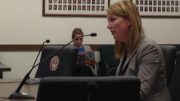By Jeffrey A. Roberts
CFOIC Executive Director
A judge has ordered a Colorado Springs school board to disclose the recordings and transcripts of executive sessions used to whittle down a group of finalists for the district superintendent’s job.
This week’s ruling is El Paso County District Court Judge Thomas Kane’s second decision in a case brought by parent Melanie Knapp against Academy District 20. Last June, Kane found that the school board improperly denied Knapp’s Colorado Open Records Act (CORA) request for the names and application materials of all superintendent finalists during two selection processes in 2019. The board named just one finalist during each process.

On Tuesday, the judge ruled that the board must release records of closed sessions held to discuss five superintendent finalists who had been interviewed and to narrow the finalist list from five to three to two and then one. Under CORA, a court can make all or portions of an executive session recording public upon finding that a public body strayed from authorized executive session discussion topics or adopted a policy or position behind closed doors.
Kane denied Knapp’s request to disclose recordings and transcripts of other executive sessions held to interview the finalists and to discuss other applicants for the superintendent’s job.
The Colorado Open Meetings law, aka the Sunshine Law, requires public bodies to reveal “the list of all finalists” under consideration for a chief executive officer position at least 14 days before an appointment is made. CORA requires the disclosure of finalists’ applications, defining “finalist” to mean an applicant for a chief executive officer position “who is a member of the final group of applicants or candidates” made public under the Sunshine Law.
If only three or fewer applicants possess the minimum qualifications for the position, they should be considered finalists, according to CORA.
“The Court finds the use of executive sessions prior to the list of five names in this case to be lawful and appropriate in balancing confidentiality of qualified applicants during the various stages of the search,” Kane wrote. “… There is a distinct interest in protecting the confidentiality of nonfinalist candidates, which is why the General Assembly created an express CORA exception to protect their application materials and, consequently, served as the justification for the executive sessions in this case.”
A bill introduced in the state legislature last week would amend CORA and the open meetings law to let public bodies disclose just one finalist when choosing a chief executive.
House Bill 21-1051 acknowledges that “multiple” courts have interpreted Colorado’s open-government laws to require the naming of more than one finalist. These include Kane’s sole-finalist ruling against Academy District 20 and a Denver District Court judge’s ruling that the University of Colorado Board of Regents violated CORA when they provided only Mark Kennedy’s application to the Boulder Daily Camera in response to the newspaper’s 2019 requests for the names and applications of all presidency finalists. The CU ruling has been appealed.
The Academy District 20 board appealed Kane’s ruling on the sole finalist question, but the Colorado Court of Appeals declined to review just that portion of the case. Now that the district court has decided all the issues in Knapp’s lawsuit, the Colorado Freedom of Information Coalition asked a school district spokesperson for comment on whether the board will appeal. The spokesperson hasn’t yet responded.
Follow the Colorado Freedom of Information Coalition on Twitter @CoFOIC. Like CFOIC’s Facebook page. Do you appreciate the information and resources provided by CFOIC? Please consider making a tax-deductible donation.




